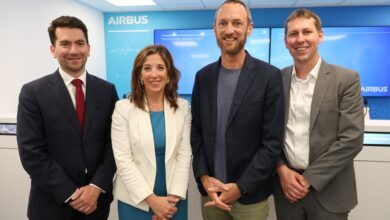Consortium to receive funding for ZEMFS powering hydrogen ships
The project will deliver zero-emission clean fuels to the maritime industry.

A consortium led by zero-emission solutions provider Unitrove, which created the world’s first liquid hydrogen bunkering facility, has won thousands of pounds of government funding to explore the development of an innovative zero-emission multi-fuel station (ZEMFS) that would power hydrogen and electric ships.
The novel design concept, which is planned to be operational by March 2025, will use liquid hydrogen to provide three fuelling options for powering small craft: liquid hydrogen, compressed gaseous hydrogen, and electric charging.
The other winning members of the consortium include ACUA Ocean, manufacturers of hydrogen-powered maritime autonomous surface ships; Zero Emissions Maritime Technology (ZEMTech), a marine-focused project management and delivery company; and the University of Strathclyde, a leading maritime research institution. The project is further supported by MJR Power & Automation, Orkney College UHI, and the Port of Tyne.
The project is part of the Clean Maritime Demonstration Competition Round 2 (CMDC2) launched in May 2022, funded by the Department for Transport (DfT), and delivered in partnership with Innovate UK. As part of the CMDC2, the Department allocated over £14 million to 31 projects supported by 121 organisations from across the UK to deliver feasibility studies and collaborative research and development projects in clean maritime solutions.
CMDC2 is part of the UK Shipping Office for Reducing Emissions’ (UK SHORE) flagship multi-year programme. UK SHORE is delivering a suite of interventions throughout 2022-2025 aimed at accelerating the design, manufacture and operation of UK-made clean maritime technologies and unlocking an industry-led transition to Net Zero.
Steven Lua, CEO of Unitrove, said: “Winning this grant is fantastic news for the consortium, and it is an excellent opportunity to help kick-start the development of a new world-first zero-emission multi-fuel station for hydrogen and electric vessels.
Michael Tinmouth, COO of ACUA Ocean, said, “ACUA Ocean are excited to be part of the ZEMFS feasibility study as we look to build the operational, economic, environmental and safety cases for clean marine fuelling solutions.”
Madadh MacLaine, CEO of Zero Emissions Maritime Technology, said, “This pilot is for vessels under 24 metres, but ZEMFS is fully scalable to any size vessel, and adaptable to any type of port infrastructure.”
Professor Peilin Zhou, Professor of Marine Engineering at the University of Strathclyde, said, “As a CMDC project, ZEMFS provides a unique opportunity for industry and academics to work together to tackle the challenge of decarbonisation in shipping by providing a novel hydrogen bunkering and electric charging solution.”
Paul Cairns, Managing Director of MJR Power & Automation, said, “As a leader in the electrification of maritime operations, MJR Power and Automation brings a wealth of knowledge and expertise to support the consortium partners’ development for an innovative zero-emission multi-fuel station.”
Mark Shiner, Curriculum Leader for Maritime and Engineering at Orkney College UHI, said, “Adapting existing frameworks will not always suffice, and we look to international bodies to develop such frameworks.”
Ian Finch, Commercial Director at Port of Tyne, said, “This project is a key demonstrator towards this ambition and complements other low carbon projects that Port of Tyne is developing across its estate, including green hydrogen production.”
Anne-Marie Trevelyan, Transport Secretary, said, “The UK has always been a proud seafaring nation and helping the maritime sector to be more environmentally friendly will mean it continues to play a key role in the UK’s economy for generations to come.”
